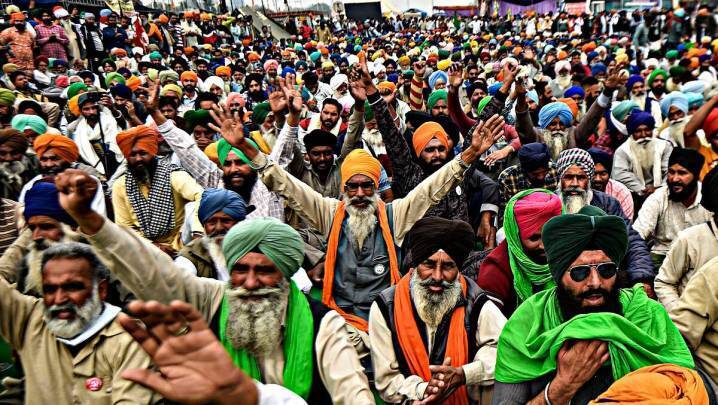Most farmers’ bodies supported the 3 farm laws, SC-appointed panel’s report reveals
The report, a copy of which was sent to The Indian Express, claimed that 61 organisations, comprising 3.3 crore farmers, it interacted with supported the farm laws.
Most of the farmers’ organisations that the Supreme Court-appointed body for studying the now-rolled-back farm laws interacted with supported the legislation, the report of the committee that was made public on Monday revealed.
Farmer leader and member of the committee Anil Ghanwat, while releasing the report, said that while the observations of the committee hold little significance in terms of its impact on the laws as they have already been repealed, it is significant for policy makers and farmers in general. The two other members of the committee — Ashok Gulati, agricultural economist and former Chairman of the Commission for Agricultural Costs and Prices and Dr Parmod Kumar Joshi, Agricultural Economist, Director for South Asia, International Food Policy Research Institute — were not present on the occasion.
The Narendra Modi-led Central government had passed the three farm laws — The Farmers Produce Trade and Commerce (Promotion and Facilitation) Act, Farmers (Empowerment and Protection) Agreement on Price Assurance and Farm Services Act and Essential Commodities (Amendment) Act — in 2020, which, after sustained protests, were finally rolled back in November 2021. While hearing a clutch of petitions, the Supreme Court had appointed a three-member committee to engage with the agitating farmers and study the laws.
According to the report, the committee had reached out to 266 farm organisations, including the ones who were agitating. Similarly, the committee also received 19,027 representations on the dedicated portal and 1,520 emails. The panel had submitted the report on March 19, 2021, in a sealed envelope to the Supreme Court. Ghanwat had written to the Chief Justice thrice, and Prime Minister Modi as well to release the report. Monday marked a year since the report was submitted following which Ghanwat decided to make it public.
The report, a copy of which was sent to The Indian Express, claimed that 73 farm organisations, which represented 3.83 crore farmers, had interacted with them either directly or through video links. Of the 73, 61 organisations, comprising 3.3 crore farmers, had supported the laws. Four organisations, representing 51 lakh farmers, had opposed it and seven, comprising 3.6 lakh farmers, wanted amendments.
“It may, however, be noted that in these interactive sessions with Farmers Organizations, the agitating farmers’ organizations at the periphery of Delhi did not join the discussions with the Committee despite repeated invites sent to them. The Committee was informed that the organizations were not willing to present before the Committee and preferred bilateral discussions with the Government. The Committee respects their decision of not participating in its deliberations. However, their concerns, as ascertained from media reports and interactions with Government, have been kept in mind by the Committee, while formulating its recommendations,” the report read.
About two-thirds of the suggestions received on the dedicated portal had supported the laws. Also, only 27.5 per cent of the farmers sold their produce at the government declared Minimum Support Price (MSP) and they were mainly form Chhatisgarh, Punjab and Madhya Pradesh, the report informed.
The committee had proposed a series of recommendations, one of which was to cap the procurement of wheat and paddy by the Food Corporation of India (FCI). Instead of largescale purchases, the committee felt the model adopted by the National Cooperative Agricultural Marketing Federation (NAFED) in terms of procurement of oilseeds and pulses can be adopted. NAFED procures 25 per cent of the total produce with a cap on individual procurement from farmers. A wide variety of changes in the public distribution system had also been suggested.
With regard to the committee’s report, Ghanwat said that it holds great educational value for farmers and policy makers and hence he had decided to make it public
Farmers mainly from North India who protested against these laws will now realise that they are the ones to lose out on an opportunity to increase their income, he added. According to Ghanwat, the repeal was also a great political mistake on part of the government because of which the BJP had a poor show in the Punjab polls.


